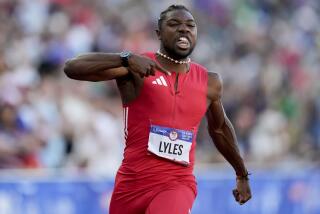Defection Leads to Near Perfection : Boston Marathon: After leaving East Germany, Pippig, a favorite in today’s race, reached world-class status.
- Share via
BOSTON — On Jan. 5, 1990, Uta Pippig and her coach Dieter Hogan drove through the pre-dawn streets of East Berlin, quietly crossed the border to the West to begin their new life. It was raining.
It seems like a lifetime ago, and in many ways it was. On that chilly morning an old life, a life of closed doors and tight lips, ended for Pippig and something new was to begin. What it would be, she didn’t know, but that it would be better--of this Pippig was certain.
When Pippig runs in today’s Boston Marathon, she will do so as one of the favorites in the women’s field, as a German citizen and, most significantly, she will run because it is her choice.
Choices, or lack of them, drove Pippig, 25, and Hogan to make the frightening and risky flight to freedom. “The need for creativity,” Pippig terms it.
For much of her life, Pippig was ensconced in East Germany’s efficient but rigid central sports system, a system that groomed her to become a great middle-distance runner but then abandoned her after her first injury.
Left to rehab by training with distance runners, Pippig’s natural speed was wasting away.
Hogan, a successful but disaffected national coach, advised Pippig to train for the marathon, as East German officials said she must, but to run 10Ks to sustain her leg speed.
Hogan’s philosophy, which is shared by most of the world’s marathoners, was rejected by his superiors.
Pippig not only wasn’t allowed to run road races, she was not allowed to leave the country. With a marathon runner competing in maybe two races a year, Pippig was on a cycle of nearly all training and no competition.
The pair felt powerless. Hogan longed to leave but Pippig, whose prominent parents might suffer retribution if she defected, was wavering.
Also, as were nearly all elite East German athletes, Pippig was made to join the army.
As a soldier, Pippig’s defection would also mean desertion, a serious charge.
Even as anti-communism was on the rise in the East, Pippig and Hogan debated.
Friends in whom they confided told them to wait, that a great change was coming, but they were anxious. Every day was like suffocating.
“Our goal was to leave the country at all times,” Pippig said in excellent but halting English. “If East is now East and West is now West, we were going over the Wall.”
So they went.
Pippig and Hogan went to Boulder, Colo., a haven for expatriate runners.
After years of restraint and relentless training, Pippig exploded with an orgy of racing.
She ran in the European cross-country season, she ran on the outdoor circuit.
In her first marathon outside the East Bloc, Pippig finished second at Boston last year in 2 hours 28 minutes 3 seconds.
Running everywhere, and everywhere surprising Westerners who had never seen her, Pippig ended the year as the world’s No. 4-ranked marathoner.
This season Pippig won the 3,000 meters at the German Championships and set an indoor world record at 5,000, her old speed gratefully restored.
“I’m not angry, more sad,” she said, suggesting that if East German officials had allowed Hogan to implement his training methods the success she’s now experiencing would have come sooner.
“I think I had more in me to make it earlier.”
Still, no regrets. Pippig’s new life is full.
She’s a medical student at Berlin Free University. The money she has earned on the road running circuit, more than $42,000 last year, has made up for the loss of government support. The unification of Germany has allowed her to reunite with teammates, family and friends.
“All things are so normal,” she said. “Everything we wished for all those years--it all has come true. It’s been such a very short time, sometimes I can’t believe it.”
It seems as if her dreams have come true, even if they had been dreams deferred. At least she has realized them, while a nation of her former countrymen have gone wanting.
“I’m young,” she said. “For me it is not so bad. Look at the people who are 50-55 years old. Their lives are gone. They had plans, too, and they couldn’t make it.”
Pippig is one in a stellar women’s field that includes world record-holder Ingrid Kristiansen, Wanda Panfil of Poland, Kim Jones of the United States and, attempting a comeback after numerous injuries and the birth of her second child, American record-holder Joan Benoit Samuelson.
The men’s race is deep and talented. The favorite is Douglas Wakiihuri of Kenya.
Wakiihuri, who lives and trains in Japan, is a feared runner because of his great intelligence and discipline.
Wakiihuri is not prone, as is the trademark of other African runners, to bolt to the lead at the start, run a blistering pace, and hang on.
Such a tactic was employed here last year as a group of six East African runners ran away from the field. A patient Gelindo Bordin of Italy won, after that lead group fell back.
Wakiihuri runs much like Bordin, and together they are the world’s top two marathoners. Bordin is not here, so Wakiihuri will have competition from Ibrahim Hussein of Kenya, Juma Ikangaa and Simon Robert Naali of Tanzania, John Treacy of Ireland and Abebe Mekonnen of Ethiopia.
The 95th running the Hopkinton to Boston race is expected to be conducted in ideal marathon weather--cold, cloudy with temperatures in the high 40s.
More to Read
Go beyond the scoreboard
Get the latest on L.A.'s teams in the daily Sports Report newsletter.
You may occasionally receive promotional content from the Los Angeles Times.











